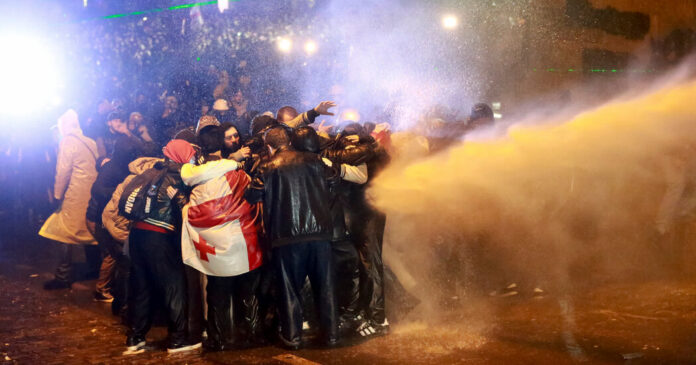Georgia has charged eight senior opposition figures, including jailed former president Mikheil Saakashvili, with plotting to overthrow the government and aiding foreign powers, deepening the country’s political crisis and raising fears of a broader crackdown on dissent.
Prosecutor General Giorgi Gvarakidze announced the charges on Thursday, accusing the opposition leaders of “engaging in activities directed against Georgia’s constitutional order and national security.” He alleged that they shared information about the country’s energy and defence sectors with Western governments to facilitate sanctions against Georgian officials.
Those accused include prominent opposition figures Nika Gvaramia, Nika Melia, Elene Khoshtaria, and Zurab Japaridze — several of whom are already imprisoned on charges widely viewed as politically motivated.
The most severe allegation, “assisting a foreign state in hostile activities,” carries a potential 15-year prison sentence.
Gvaramia dismissed the move as “absurd political theatre,” accusing the ruling Georgian Dream party of “waging war on democracy.” He wrote on social media, “The oligarchy must fall.”
Japaridze, who leads the Girchi party, said the government “has crossed the final line into authoritarianism,” while Khoshtaria of the Droa party vowed, “No intimidation will stop us from defending Georgia’s European future.”
Saakashvili, a reformist and pro-Western ex-president serving a 12.5-year sentence for abuse of office — a conviction denounced by rights groups as politically motivated — was also named in the new indictment. Prosecutors claim he urged supporters online “to resist and topple the regime.”
Georgia has been gripped by political turmoil since last year’s disputed parliamentary elections, which the opposition says were rigged in favour of Georgian Dream.
Last month, the ruling party asked the Constitutional Court to ban the country’s three main opposition forces entirely.
Once seen as a liberal, pro-European party, Georgian Dream which has been in power since 2012 now faces accusations of drifting toward Moscow and undermining the country’s bid to join the European Union.
The government has rejected those claims, insisting it is working to preserve stability following Russia’s invasion of Ukraine.
The European Union has repeatedly criticised what it describes as Georgia’s democratic backsliding and growing intolerance toward dissent.

